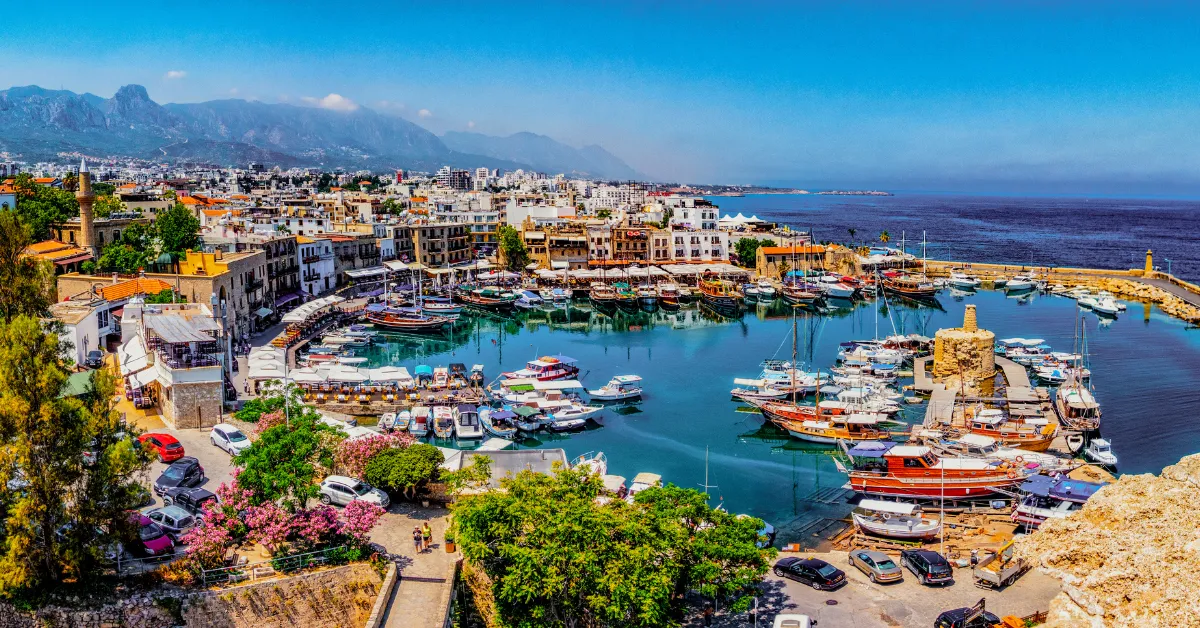If you’re considering a big move, a picturesque island with endless sunshine and all-you-can-eat halloumi may fit the bill.
But is it all friendly locals and lounging on the beach after work?
In this post, we’re going to be looking into the pros and cons of living in Cyprus to help you figure out whether this island is your idea of paradise or not.
Regardless of how many stamps are on your passport, moving to a new country is a big leap and one that requires a little thought.
After all, there is a big difference between taking a two-week vacation to a destination and living there.
Keep reading to check out these top advantages and disadvantages of living in Cyprus.
Pros Of Living In Cyprus
There are plenty of advantages to living in Cyprus. The slow-paced island holds a lot of charm for foreigners, so check out these main advantages.
Easy Adjustment
One of the biggest issues with moving overseas is the worry of a language barrier.
However, if you decide to live in Cyprus, you’ll find it remarkably easier than if you were to choose a different country.
This is because English is widely spoken across the island. From shopkeepers to bank staff, many residents on the island are fluent in English.
In fact, around three-quarters of the general public have at least a basic understanding of the language and the ability to hold a conversation with you.
Additionally, road signs, menus, shop labels, etc are all printed in English, which makes adjusting to your new life abroad just a little bit easier.
Low Cost Of Living
Rent is almost always the largest expense you’ll have when you move to another country. Luckily, another pro of living in Cyprus is its affordable housing prices.
If you wish to live in the city center, you can expect to pay between €700 and €1,500 per month for an apartment, depending on how many bedrooms you require.
If you leave the city and opt to lease in a countryside or beach location, you’ll benefit from reduced housing prices. You’ll pay between €600 and €1,200 for apartments of varying sizes.
Utility bills are unavoidable unless you live in a hotel or Airbnb. However, most people will choose to live in a short or long-term rental, where you’ll be expected to cover running costs, such as electricity and gas.
On average, you’ll pay around €150 per month for these utilities in a medium-sized apartment.
You can purchase a monthly transportation pass for around €40. However, if you choose to reside outside of the city, you may need to rely on taxis instead. These are relatively affordable and charge on average €1 per kilometer.
Groceries are on par with other western countries, with a morning coffee setting you back around €3. If you wish to dine out with a friend, you can expect to pay around €25 per person for a three-course meal.
Alternatively, if you want to grab a quick bite on the go, you can purchase a fast food meal for around €6.
Because of Cyprus’ fantastic weather, a lot of activities take place outside, and are either free (hiking, going to the beach, swimming, etc) or low cost.
Low Crime Rate
Armed robberies, sexual assaults, and even death are all situations that flash through your mind when you’re preparing to move abroad.
And, if they haven’t entered your brain yet, you can be sure a family member will be able to scare you into not wanting to go.
However, one of the biggest advantages of living in Cyprus is its low crime rate.
Officially named one of the safest destinations in Europe, the island has no need for security guards roaming hotels or stationed at shop entrances.
In fact, the majority of the police take a vacation in August and no one bats an eye. Of the crimes that do happen, most are petty and non-violent, such as pickpocketing or drug dealing.
Among the most common crimes are bribery and corruption.
Despite the almost non-existent crime rate, unsavory incidents do occasionally occur and you should act responsibly to avoid situations like this.
Follow standard travel advice, such as keeping your valuables tucked away, avoiding walking alone at night if possible, and letting your hotel know when to expect you back.
Expat Community
When you move to Cyprus, you’ll be in good company. That’s because there is a thriving community of ex-pats from all over the world waiting to greet you. Over 20% of the island’s population is made up of foreigners.
These ex-pats come from many different countries, but the largest number of foreign residents have made their way to Cyprus from the UK, in search of a sunnier climate and more laid-back lifestyle.
As well as British nationals, you’ll find US citizens, Russians, and plenty of other different cultures mixed together in this melting pot of customs and traditions.
The ex-pat culture has brought with it several co-working spaces all over the island, where, not only will you find it easy to get a load of work done, but you can also connect with others who have a similar situation to you.
Perfect Weather
Another benefit of living in Cyprus is its weather. If you’re traveling from a northern region, you’ll be blown away by the endless sunny days the island experiences in the summer.
During the hottest time of the year, temperatures can range up to 37 degrees Celsius.
However, this is uncommon and usually, you’ll find temperatures at this time hover between a manageable 25 and 30 degrees Celsius.
As you leave the summer behind, you’ll find the fall months especially pleasant with warm conditions and no need for air conditioning.
The winters are mild compared to other European countries and average temperatures in the winter sit around 13 degrees Celsius.
Cyprus rarely dips below 8 degrees Celsius, unlike many other countries on the continent.
European Union Country
While the fact that Cyprus is in the European Union won’t have much of an impact on travelers from different continents, residents from other EU nations will be delighted by this news.
This is because there is free movement between all EU nations, meaning you can move to Cyprus without a mound of paperwork or difficult-to-obtain visas. Simply grab your suitcase and your passport and go.
If you’re not from one of the 27 nations in the EU, you can buy both citizenship and permanent residency by investing in the island’s real estate.
Low Taxes
Another benefit of living in Cyprus is the tax rate for non-residents, which benefits digital nomads greatly.
The taxation rate works on a scale, with those earning less than €19,500 per year avoiding any additional taxes. Taxes for those earning above this threshold are as follows:
- €19,501 – €28,000: 20%
- €28,001 – €36,300: 25%
- €36,301 – €60,000: 30%
- €60,000+: 35%
Cons Of Living In Cyprus
Like any destination, there are several disadvantages to living in Cyprus. It’s best to see both sides of the coin before committing to moving across the world.
Limited Transportation Options
A disadvantage of living in Cyprus is its lack of public transportation. While you may be able to get by without a car if you live in the center of Paphos, those residing further out will need a car.
There is no train system on the island, so those wishing to make do on public transport will have to rely on buses.
There are many buses to choose from, which run regularly, are reliable, and will drop you at various destinations across Cyprus.
However, many locations cannot be reached by bus, requiring you to hop in a taxi. It’s also worth noting that the south of the island has much better transportation infrastructure than the north.
Low Salaries
Those moving to Cyprus with an online remote job can have the best of all worlds.
They can enjoy the beautiful climate, stunning scenery, and low cost of living on the island, all while earning a wage that is comparable with the rest of the western world.
However, job seekers may be in for a culture shock when they find out the salaries of positions in Cyprus.
There is no national minimum wage, which enables employers to cap monthly earnings however they see fit.
Foreigners are often not selected for higher earning roles and may have to scrape by with seasonal opportunities, which include bartending and hotel work.
Lack Of Options
Cyprus is a small island in the south of Europe. Because of this, you may find that another drawback of living in Cyprus is its limited options when it comes to shopping and entertainment.
If you need specific items while on the island, you might be trawling endlessly through its independent shops and boutiques, wishing you could find an international department store.
If you’ve come from a country with a rich arts culture, you’re bound to find the entertainment on the island subpar.
While theater, performances, and galleries do exist, they are few and far between. However, what Cyprus lacks in artistic flair, it makes up for in outdoor activities.
If you’re into spending time in the natural world, you’ll find no shortage of things to do. From hiking to quad biking, snorkeling, and horse riding, there’s plenty to keep you occupied.
Final Thoughts On Living In Cyprus
Now you’ve read the pros and cons of living in Cyprus, you can decide whether the breathtaking island in the Mediterranean Sea is the place for you.
If you are from the European Union and are looking to make friends with other ex-pats as you soak in the sunshine, Cyprus is a great option for you.
If, on the other hand, you don’t own a driving license or are seeking a high-paid job, you may wish to look elsewhere.
If you’re still weighing up your options, check out these posts:
- Pros and cons of living in Malaysia
- Pros and cons of living in Turkey
- Pros and cons of living in Vietnam
Do you have your travel insurance?
- ☑ SafetyWing offers affordable travel medical insurance. Prices start at $45.08 / 4 weeks.
- ☑ Created by nomads, for nomads.
- ☑ Covers quarantine and Covid-19.
- ☑ You can pay per month, and stop at anytime.


